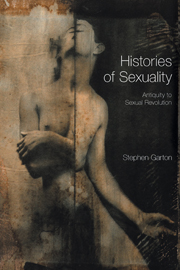Book contents
- Frontmatter
- Dedication
- Contents
- Preface
- 1 Writing Sexual History
- 2 Rule of the Phallus
- 3 Sexual Austerity
- 4 Christian Friendships
- 5 Making Heterosexuality
- 6 Victorianism
- 7 Dominance and Desire
- 8 Feminism and Friendship
- 9 Imagining Perversion
- 10 Normalizing Sexuality
- 11 Sexual Revolution
- Epilogue
- Endnotes
- Select Bibliography
- Index
2 - Rule of the Phallus
- Frontmatter
- Dedication
- Contents
- Preface
- 1 Writing Sexual History
- 2 Rule of the Phallus
- 3 Sexual Austerity
- 4 Christian Friendships
- 5 Making Heterosexuality
- 6 Victorianism
- 7 Dominance and Desire
- 8 Feminism and Friendship
- 9 Imagining Perversion
- 10 Normalizing Sexuality
- 11 Sexual Revolution
- Epilogue
- Endnotes
- Select Bibliography
- Index
Summary
Ancient Greece and Rome have shaped Western culture in profound ways, and remain a source of intense cultural, philosophical and historical interest. As the supposed cradle of modern civilization, Athens and Rome have functioned for centuries as the source for numerous reflections on such fundamental questions as freedom and democracy. Classical antiquity also laid the foundation for such disciplines as ethics, geometry, metaphysics and aesthetics. The one exception to this scholarly interest has been sexuality. Many of the classic accounts of the ancient world, such as those by Jacob Burckhardt, Wilhelm Kroll or H.I. Marrow, ignored, or only mentioned in passing, the importance of ‘male love’ in Athens and Rome. A few adventurous scholars, such as Fredrich-Karl Forberg in the 1820s and Hans Licht (Paul Brandt) and Theodore Hopfner in the 1930s, highlighted the prevalence of ‘male homosexuality’ in antiquity but their work lay outside the mainstream of classical studies. In the early 1960s homophile social reformers, such as J.Z. Eglinton, turned to a history of ‘Greek love’ in an effort to preach the virtues of ‘pederasty’.
The scholarly silence on ancient homosexuality was not really broken until the early 1970s when scholars such as Jeffrey Henderson and John Boardman opened up the field. In 1978 Kenneth Dover published his authoritative study Greek Homosexuality, which put homosexuality, or more correctly pederasty, at the centre of Greek culture. Pedagogic and erotic relationships between male citizens and youths were, for Dover, the cornerstone of Greek culture, evident in philosophy, art, and literature.
- Type
- Chapter
- Information
- Histories of SexualityAntiquity to Sexual Revolution, pp. 30 - 47Publisher: Acumen PublishingPrint publication year: 2004



